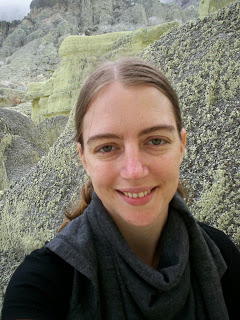The ebb and flow of the academic year
 Today, Genevieve is sharing her academic schedule with us. Genevieve is a physicist in Melbourne, Australia. She works in an area of medical physics, primarily looking at the lungs and brain. She’s on twitter, too: @LuminescentFish.
Today, Genevieve is sharing her academic schedule with us. Genevieve is a physicist in Melbourne, Australia. She works in an area of medical physics, primarily looking at the lungs and brain. She’s on twitter, too: @LuminescentFish.
I’m a research assistant, paid out of a research grant awarded to a particular project. That means all of my time goes towards research. I don’t have to carve out time for research from other commitments, a luxury of sorts in academia. This is a big contrast to the way my supervisors spend their time, with lots of meetings, supervision and grant writing to take care of.
Arriving at work, I dump my coat on the spare chair, make myself a mug of tea and fire up my email. That’s how most mornings go. For me, there’s no shortage of time for focused research work. Typically I will work on one or two major tasks for a project that day, but will have three or four things going at any one time. Keeping a running list of priorities (like Adam’s list) is necessary so I don’t get sucked into just the problem I’ve been working on for the last three hours.
Day to day, I have a lot of freedom and flexibility in choosing what to work on when. I do a lot of writing code and image analysis. Occasionally I make computer simulations to confirm theoretical approaches, and to test the stability of the algorithm (by adding noise, etc.) before putting it to the test with real data.
I will often re-do an analysis two or three times. Because there’s another complicating factor we hadn’t thought of, or because we need to rule out the possibility of a mistake in the code, or one of a hundred other good reasons. Or I will repeat the same analysis many times, but varying the parameters slightly each time, so we can see how stable it is as a practical solution when someone else tries it. You have to be good with frustration. Things don’t work, and don’t work, and don’t work some more sometimes.
There’s also churning through the tedious tasks that need to be done before I can look for signs in the data to back up a shiny, exciting new idea. And because I’m an assistant, that means I do all the data crunching that I haven’t yet figured out how to automate. Bit by bit, I am trying to put in the time to automate these tasks. It gets tricky though, trying to balance the potential long term gain against a short term time sink when there are other pressing things to do.
Finally, there is the ever-growing digital pile of papers I mean to read in more detail but haven’t yet. I am good at keeping tabs on what is coming out in new journal issues, but not so good about following through with a close, detailed read of all the papers that seemed valuable on the first skim through. This is perhaps the single common thread among all academic schedules: there are always more papers to read than time available!
But there are larger rhythms to my academic schedule. We are ramping up to our busy season now, in fact, and this yearly ebb and flow governs everything else. Our research group is a large multidisciplinary collaboration, including physicists, engineers, biologists and medical doctors. While there are a few labs on campus where we sometimes do experiments, the bulk of our experimental data comes from synchrotron X-ray sources, which we travel to once or twice a year.
When it’s on, it’s on! Long hours, crappy cafeteria food, you name it. Having a good research group where people get along well with one another is critical for making this work. You love it or hate it, really. I must be one of the nuttier ones, because I keep coming back. The data you take now will be what you have to work with for the next six or so months, so you have to make it count. The beamlines are on 24/7 and so, more or less, we are too.
Then, once we have schlepped home several terabytes of experimental data, there’s a flurry of activity making sure it’s backed up on the network, beginning to pre-process the data, and settling back into the usual rhythm of things. Arriving at work, dumping my coat on the chair, making a mug of tea, and firing up my email…
